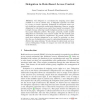163 search results - page 3 / 33 » Specifying and enforcing constraints in role-based access co... |
HICSS
2009
IEEE
14 years 2 months ago
2009
IEEE
Web services have emerged as a de facto standard for encapsulating services within or across organization boundaries. Various proposals have been made to compose Web services into...
SACMAT
2003
ACM
14 years 19 days ago
2003
ACM
A Generalized Temporal Role Based Access Control (GTRBAC) model that captures an exhaustive set of temporal constraint needs for access control has recently been proposed. GTRBACā...
ESORICS
2006
Springer
13 years 11 months ago
2006
Springer
User delegation is a mechanism for assigning access rights available to a user to another user. A delegation operation can either be a grant or transfer operation. Delegation for r...
IWFM
2000
13 years 8 months ago
2000
Security services in a multi-user environment are often based on access control mechanisms. Static of an access control policy can be formalised using abstract algebraic models. W...
SACMAT
2006
ACM
14 years 1 months ago
2006
ACM
Separation of Duty (SoD) is widely recognized to be a fundamental principle in computer security. A Static SoD (SSoD) policy states that in order to have all permissions necessary...

